From the Middle East to Southeast Asia, Trump has claimed credit for brokering ceasefires and ending wars. With the recent announcement of a truce between Israel and Hamas, he is doubling down on those claims, even suggesting he deserves a Nobel Peace Prize.
In June, Trump announced a ceasefire between Israel and Iran, bringing an end to a dangerous bout of fighting that began when Israel bombed Iranian nuclear sites, triggering retaliation that included an Iranian strike on the largest U.S. military base in Qatar. Trump played a direct role—ordering U.S. strikes on three Iranian nuclear facilities. While the war ended with his mediation, critics note that his involvement helped escalate the conflict in the first place.
Similarly, in the case of Gaza, Trump claimed in September that he “deserved” recognition for potentially ending Israel’s two-year war on the territory. The U.S.—under Trump as well as Biden—has provided significant military and diplomatic support to Israel.
However, Trump is believed by some analysts to have applied greater pressure on Prime Minister Benjamin Netanyahu to end the fighting than Biden had. A 20-point peace plan unveiled by Trump was followed by a ceasefire agreement, bringing the war closer to conclusion than at any previous point.
Ceasefires and Credibility:
In May, when tensions exploded between India and Pakistan in an aerial conflict, Trump again stepped into the fray. Both countries exchanged military strikes, with India targeting what it called “terrorist” bases and Pakistan accusing India of civilian casualties. After four days, Trump announced a ceasefire. Pakistan credited him with helping stop the conflict—India denied any U.S. involvement.
The pattern repeated in August, when Cambodia and Thailand clashed in a five-day border skirmish. Trump made phone calls to leaders on both sides, but he was joined by Malaysia’s Prime Minister Anwar Ibrahim and Chinese negotiators. Only Cambodia has publicly thanked Trump, leaving the extent of his influence unclear.
In June, Rwanda and the Democratic Republic of Congo signed a peace agreement with Trump’s involvement. Though tensions remain high and the ceasefire is fragile, the deal has held—for now.
And in August, Trump presided over a historic White House signing of a peace agreement between Armenia and Azerbaijan—two nations locked in intermittent conflict since the fall of the Soviet Union. However, in a later interview with Fox & Friends, Trump confused Azerbaijan with Albania, raising doubts about his grasp of the region’s complexities.
Not all of Trump’s self-proclaimed victories in diplomacy stand up to scrutiny. He has claimed to have ended a “war” between Egypt and Ethiopia, though no actual war occurred—just long-standing tensions over Ethiopia’s Nile dam project.
Similarly, Trump frequently points to the 2020 economic normalization agreement between Serbia and Kosovo, signed during his first term, as evidence of his peace-building prowess. While full-blown conflict has been avoided since then, tensions continue, and regional experts still credit the European Union and NATO as the primary mediators.
Trump’s foreign policy legacy particularly on war and peace is a patchwork of assertive diplomacy, personal showmanship, and ambiguous results. Supporters argue that his brash, unconventional style forces adversaries to the table. Critics say he often inserts himself into conflicts after contributing to their escalation or overstates his role in resolving them.















